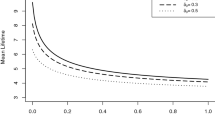Abstract
We revisit the ‘classical’ delta-shock model and generalize it to the case of renewal processes of external shocks with arbitrary inter-arrival times and arbitrary distribution of the ‘recovery’ parameter delta. Our innovative approach is based on defining the renewal points for the model and deriving the corresponding integral equations for the survival probabilities of interest that describe the setting probabilistically. As examples, the cases of exponentially distributed and constant delta are analyzed. Furthermore, delta shock modeling for systems with protection and two shock processes is considered. The first process targets the defense system and can partially destroy it. In this case, the second process that targets the main, protected system can result in its failure. The damages of the defense system are recovered during the recovery time delta. As exact solutions of the discussed problems are rather cumbersome, we provide simple and easy approximate solutions that can be implemented in practice. These results are justified under the assumption of ‘fast repair’ when the recovery time delta is stochastically much smaller than the inter-arrival times of the shock processes. The corresponding numerical examples (with discussion) illustrate our findings.


Similar content being viewed by others
References
Beichelt F, Fischer K (1980) General failure model applied to preventive maintenance policies. IEEE Trans Reliab 29:39–41
Brown M, Proschan F (1983) Imperfect repair. J Appl Probab 20:851–859
Cha JH, Finkelstein M, Marais F (2014) Survival of systems with protection subject to two types of external attacks. Ann Oper Res 212:79–91
Chadjiconstantinidis S, Tuncel A, Eryilmaz S (2022) Α new mixed δ-shock model with a change in shock distribution. TOP 31:1–19
Eryılmaz S (2012) Generalized δ-shock model via runs. Statist Probab Lett 82:326–331
Eryilmaz S (2017) shock model based on the Polya process and its optimal replacement. Eur J Oper Res 263:690–697
Eryilmaz S, Bayramoglu K (2014) Life behavior of δ-shock models for uniformly distributed interarrival times. Stat Pap 55:841–852
Eryilmaz S, Finkelstein M (2022) Reliability of the two-unit priority standby system revisited. J Risk and Reliab 236:1096–1103
Finkelstein M (2008) Failure rate modelling for reliability and risk. Springer, London
Finkelstein M, Cha JH (2013) Stochastic modelling for reliability (Shocks, burn-in and heterogeneous populations). Springer, London
Finkelstein M, Zarudnij VI (2001) A shock process with non-cumulative damage. Reliab Eng Syst Saf 71:103–107
Goyal D, Hazra NK, Finkelstein M (2022a) On the general δ-shock model. TEST 31:994–1029
Goyal D, Hazra NK, Finkelstein M (2022b) On the time-dependent delta-shock model governed by the generalized Polya process. Methodol Comput Appl Probab 24:1627–1650
Jiang Y (2020) A new δ-shock model for systems subject to multiple failure types and its optimal order-replacement policy. Proc Instit Mech Eng Part O 234:138–150
Li Z, Zhao P (2007) Reliability analysis on the shock model of complex systems. IEEE Trans Reliab 56:340–348
Li Z, Chan LY, Yuan Z (1999) Failure time distribution under a δ-shock model and its application to economic design of systems. Int J Reliab Qual Saf Eng 6:237–247
Lorvand H, Kelkinnama M (2023) Reliability analysis and optimal replacement for a k-out-of-n system under a delta-shock model. J Risk Reliab 237:98–11
Lorvand H, Poursaeed MH, Nematollahi AR (2020) On the life distribution behavior of the generalized mixed δ-shock models for the multi-state systems. Iran J Sci Technol Transac A Sci 44:839–850
Ross S (1996) Stochastic processes. Wiley, New York
Tang Y, Lam Y (2006) A delta-shock maintenance model for a deteriorating system. Eur J Oper Res 148:541–556
Wang GJ, Peng R (2017) A generalized -shock model with two types of shocks. Int J Syst Sci 4:372–383
Wang GJ, Zhang YL (2005) A shock model with two-type failures and optimal replacement policy. Int J Syst Sci 36:209–214
Wang X, Zhao X, Wu C, Wang S (2022) Mixed shock model for multi-state weighted k-out-of-n: F systems with degraded resistance against shocks. Reliab Eng Syst Saf 217:108098
Wang X, Ning R, Zhao X (2023) Generalized mixed shock model for multicomponent systems in the shock environment with a change point. Proceed Instit Mech Eng Part O 237:619–635
Zhao X, Qi X, Wang X (2023) Reliability assessment for coherent systems operating under a generalized mixed shock model with multiple change points of the environment. Reliab Eng Syst Saf 239:109526
Acknowledgements
The authors thank the reviewers for helpful comments and advice. The work of the second author was supported by the National Research Foundation of Korea (NRF) grant funded by the Korea government (MSIP) (No. 2023R1A2C1003238). The work of the second author was also supported by Basic Science Research Program through the National Research Foundation of Korea (NRF) funded by the Ministry of Education (Grant Number: 2019R1A6A1A11051177).
Author information
Authors and Affiliations
Corresponding author
Additional information
Publisher's Note
Springer Nature remains neutral with regard to jurisdictional claims in published maps and institutional affiliations.
Rights and permissions
Springer Nature or its licensor (e.g. a society or other partner) holds exclusive rights to this article under a publishing agreement with the author(s) or other rightsholder(s); author self-archiving of the accepted manuscript version of this article is solely governed by the terms of such publishing agreement and applicable law.
About this article
Cite this article
Finkelstein, M., Cha, J.H. Discussing some approaches to delta-shock modeling. TOP (2024). https://doi.org/10.1007/s11750-024-00665-z
Received:
Accepted:
Published:
DOI: https://doi.org/10.1007/s11750-024-00665-z




